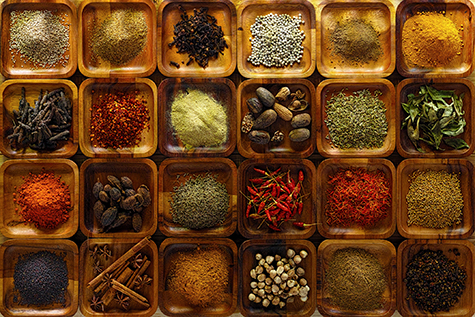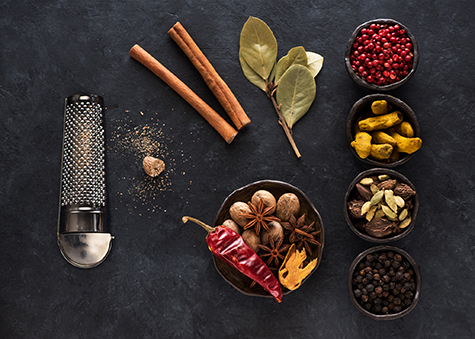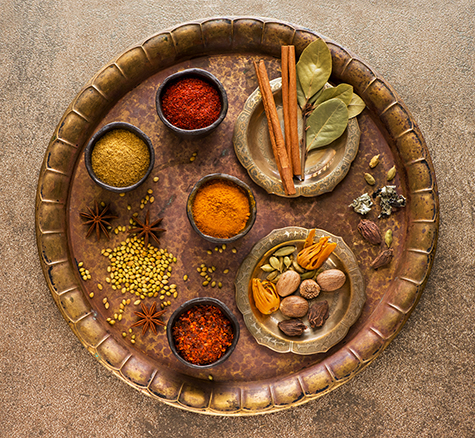Garam Masala: A Spice Blend with Benefits

Traditional spice blends like garam masala contain a variety of health properties in addition to being a seasoning for many dishes. There’s likely a reason beyond the wonderful flavor combination that these blends were created. Garam masala is a blend made of cumin, coriander, cardamom, cinnamon, cloves, nutmeg, and fennel and this is a spice combination that you should include in your diet for health benefits in addition to flavoring recipes. This herb and spice mixture likely originated from northern India and is used around the world today. A masala is a spice blend so garam masala means “hot spice” because this combination is designed for its warming properties.
Here’s a breakdown of the most common health benefits of each of its components:
· Cumin: antibacterial, anti-cancer in animal studies, antifungal, blood sugar lowering, anti-inflammatory, antioxidant.
· Coriander: lessens gastrointestinal problems and stimulates appetite, stimulates lactation, blood sugar lowering, antibacterial, anti-inflammatory, antifungal.
· Cardamom: blood pressure lowering, anti-cancer in animal studies, anti-inflammatory, antimicrobial, blood thinning, diuretic effects, antioxidant.
· Cinnamon: blood sugar lowering, immune system stimulating, anti-bacterial, antioxidant.
· Cloves: blood thinning and cardiovascular support, blood sugar lowering, treating cough and gastrointestinal troubles.
· Nutmeg: nausea, diarrhea, treating insomnia through sedative effects, pain reducing, blood thinning, antidepressant/mood stimulating, anti-microbial, anti-inflammatory, skin soothing.
· Fennel: boosting libido, treating gastrointestinal problems including colic in babies, blood thinning, anti-inflammatory, anti-microbial and anti-viral, anti-inflammatory, blood sugar lowering.
It’s important to note that many of these compounds do contain antioxidant and anti-inflammatory benefits, so including them could be very supportive to the body in a variety of ways. Eating these kinds of spices is important for a number of systems in the body.
There actually are studies on garam masala specifically as a blend showing its potential benefit to human health. Antimicrobial and antioxidant properties have been studied and though more research is needed and benefits will also depend on the formulation of the spice blend, researchers conclude that garam masala shows some promising effects.
There are a few safety considerations to keep in mind with garam masala and those are all dependent on the spice blend itself. Just like other herbs and spices, it is safe in the amounts you’d use in food. Most people don’t supplement with garam masala (it’s so tasty to eat!) so if you’re not taking it in capsule or tincture form, any potential side effects lessen greatly. Many of these individual spices are supplemented on their own in more concentrated form and some do cause some gastrointestinal (cloves), blood pressure lowering (coriander), or blood thinning side effects (cumin, clove) or even could be toxic at very high doses (nutmeg and cinnamon). Some people are allergic to one or more of these spices as well. Always use caution in children or while breastfeeding but again, in the amount you’d get from eating it, even daily, these are not true risks. Enjoy this incredible spice blend in your recipes!
How do you use garam masala? Do you enjoy the medicinal benefits or just the delicious flavor?
Resources Basu T, Bhattacharyya S, Maitra S, Rai C. Evaluation of antioxidant and antimicrobial activities of Garam Masala, an Indian spice blend, and its’ components In Vitro. Der Pharmacia Lettre. 2016;8(20):110-6.
Natural Medicines Database. Cumin https://naturalmedicines.therapeuticresearch.com/databases/food,-herbs-supplements/professional.aspx?productid=635. Updated 2/25/19. Accessed 10/19/19.
Natural Medicines Database. Coriander https://naturalmedicines.therapeuticresearch.com/databases/food,-herbs-supplements/professional.aspx?productid=117. Updated 2/25/19. Accessed 10/19/19.
Natural Medicines Database. Cardamom. https://naturalmedicines.therapeuticresearch.com/databases/food,-herbs-supplements/professional.aspx?productid=614. Updated 3/11/19. Accessed 10/19/19.
Natural Medicines Database. Cinnamon. https://naturalmedicines.therapeuticresearch.com/databases/food,-herbs-supplements/professional.aspx?productid=1002. Updated 4/19/19. Accessed 10/19/19.
Natural Medicines Database. Clove https://naturalmedicines.therapeuticresearch.com/databases/food,-herbs-supplements/professional.aspx?productid=251. Updated 7/23/19. Accessed 10/19/19.
Natural Medicines Database. Nutmeg. https://naturalmedicines.therapeuticresearch.com/databases/food,-herbs-supplements/professional.aspx?productid=251. Updated 4/1/19. Accessed 10/19/19.
Natural Medicines Database. Fennel. https://naturalmedicines.therapeuticresearch.com/databases/food,-herbs-supplements/professional.aspx?productid=311. Updated 2/6/19. Accessed 10/19/19.


